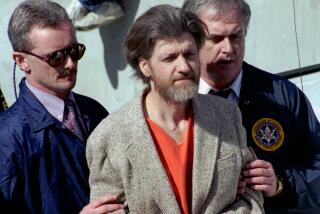Last-Minute ‘No-Strings’ Offer Ended Tortuous Process
- Share via
SACRAMENTO — Two years ago, David Kaczynski made an anguished choice. Fearing his reclusive older brother might be the murderous Unabomber, the New York social worker shared his suspicions with the FBI.
That tip, as is well known now, cracked the notorious case and brought a blessed end to an 18-year bombing rampage that killed three and injured 29.
But it left David Kaczynski in a wrenching state of suspense. What would become of Ted? Would he die for his crimes? Would David be left to live with his brother’s blood on his hands?
On Thursday, David Kaczynski savored a conclusion he had sought all along. While it was bittersweet--his brother will spend the rest of his life in federal prison, without the possibility of ever walking in the Montana woods again--it spares the Unabomber from a worse fate, a potential sentence of death.
The road that led to the plea agreement was a tortuous one, with numerous zigs and zags that kept Theodore Kaczynski’s fate uncertain until the very end. Indeed, one source close to the case said the deal was not sealed until 11 a.m.--three hours after the day’s court session began.
While the defense had from the start expressed an interest in an agreement to spare its client from death, the government was reluctant to back off its pledge to pursue the ultimate penalty for the notorious crimes.
Assistant U.S. Atty. Robert Cleary said the pivotal factor that changed the government’s position was Kaczynski’s offer to plead guilty “with no strings attached.”
Although Cleary would not elaborate, sources close to the case said the defense had dropped its earlier demand that Kaczynski be allowed to appeal a key ruling allowing the government to use incriminating evidence found in the defendant’s Montana cabin.
When that condition was removed, Cleary telephoned Washington and consulted with victims and other federal officials for more than an hour, sources said. The talks concluded when Atty. Gen. Janet Reno said she was comfortable with the agreement, they said.
In addition to the change in the defense posture, the government was pressured toward a plea agreement by a report from an independent psychiatrist who examined Kaczynski last week. The psychiatrist diagnosed him as a paranoid schizophrenic, as his family and attorneys have long maintained.
“That report clearly broke the back of the case,” said one source involved in the plea bargain negotiations.
“They finally had evidence they trusted that this guy was not connected with reality,” said Charles Bloodgood, a Sacramento defense attorney who tracked the case.
Cleary acknowledged that the psychiatric report by Dr. Sally Johnson was “one factor” in the decision to avoid a trial and bring the legal saga to a quiet close.
Defense attorneys agreed that the report--coming from a psychiatrist whose credibility the federal government trusted--was crucial.
“When they realized he was suffering from a serious mental illness--as we have argued all along--that certainly was seen as a good reason for not seeking the death penalty,” said Quin Denvir, one of Kaczynski’s attorneys. “Any other result would have been a total injustice.”
What remained unclear Thursday was whether another of David Kaczynski’s wishes--that his brother receive psychiatric help--would come true.
Kaczynski’s lawyers will undoubtedly make that recommendation, but they could not say Thursday where they wish to have their client live out his life. The U.S. Bureau of Prisons will ultimately make that determination.
“Everyone who has had contact with him calls him a model prisoner,” said Gary Sowards, another of Kaczynski’s lawyers. “The truth is, he is not a criminal who acted out of vengeance or rancor, but a person who is seriously ill and should be treated as such.”
Federal prosecutors, summing up their feelings after the legal drama concluded, took time to thank David Kaczynski and said the nation should be “eternally indebted” to him.
But the Kaczynski brothers--who once shared so much--are now estranged. Theodore has rebuffed David’s attempts to visit him, and there is little hope that will change.
Still, with the settlement, David Kaczynski can be free of his worst fear. Now, he said in a calm voice outside the federal courthouse Thursday, he and his mother can move on, to “begin a process of healing.”
Times staff writers Ronald J. Ostrow and Carl Ingram contributed to this story.
More to Read
Sign up for Essential California
The most important California stories and recommendations in your inbox every morning.
You may occasionally receive promotional content from the Los Angeles Times.













